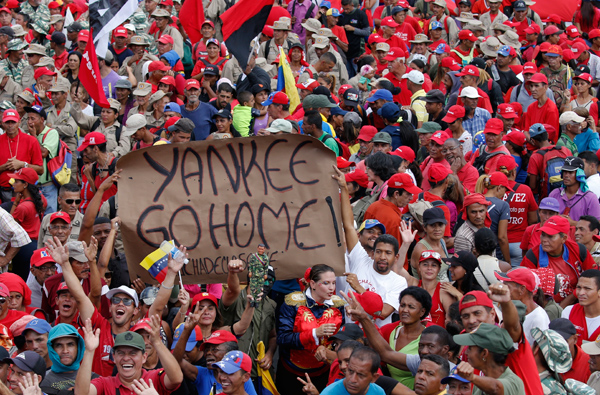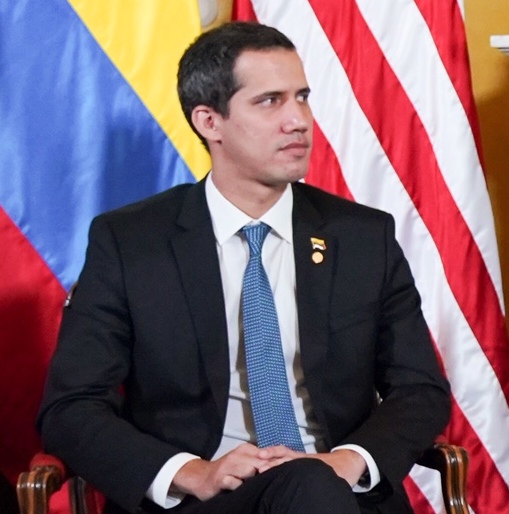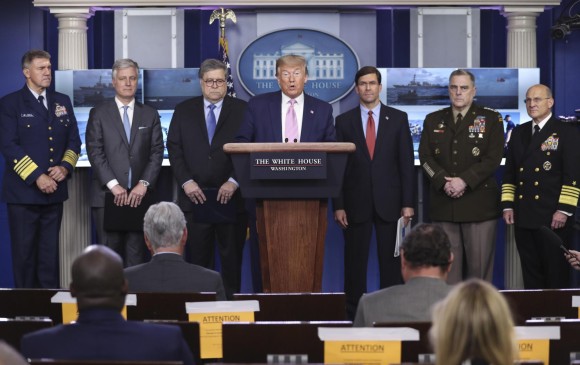Over the past week, US imperialism has escalated its levels of aggression against the Venezuelan government. These escalations include the accusations of drug trafficking against Maduro and 13 senior officials of the Venezuelan state, a new plan of terrorism and assassination carried out from Colombian territory, and the Trump administration's announcement of a new transitional plan in our country – without Maduro and without Guaidó – with a gradual lifting of economic sanctions. We can now add to this list the deployment of naval forces near Venezuelan coasts in the Caribbean, under the excuse of an "anti-drug operation."
On Wednesday 1 April, Donald Trump, in the company of his Secretary of Defence Mark Sper, and the United States Attorney General William Barr, announced the sending of combat ships, naval boats, destroyer ships, planes, and helicopters to the Caribbean and the Eastern Pacific for alleged drug trafficking operations. With rhetoric riddled with euphemisms, the head of the White House claimed: "The United States is launching enhanced counter-narcotics operations in the Western Hemisphere to protect the American people from the deadly scourge of illegal narcotics."
Later, in an obvious allusion to the Venezuelan government, he concluded: "We must not let the drug cartels exploit the [coronavirus] pandemic to threaten American lives."
The fact that American imperialism is redoubling, almost desperately, its plan to consummate a change of government in Venezuela is not accidental. Now it is clear that the recent world tour of Guaidó, which ended in the US, was intended to prepare the political-diplomatic terrain for this offensive. Its execution is part of other more pressing concerns that keep the White House's current tenant up at night. The spread of Covid-19 in the United States has exposed to the public the ineptitude of the Trump administration and of US capitalism more widely. The deep economic recession that has already started, the causes of which predate the pandemic but have been precipitated by the virus, and the growing anger among the North American masses at the current situation, motivate a desperate Donald Trump to try to divert attention from his internal problems by attempting to present himself as a fierce fighter against the "axis of evil". All of Trump's attention is clearly focused on the presidential elections scheduled for the end of the year.
This is confirmed by the resistance that Donald Trump apparently found within certain sectors of the US Department of Defence when trying to proceed with the announced measure. According to a source quoted by Foreign Policy magazine, the opposition was due to the inappropriateness of the decision, precisely at a time when the White House estimates a figure of 240,000 US deaths from the Covid-19 virus, and when the deployment of resources to combat the pandemic are limited. None of this mattered to Donald Trump, who is simply desperate to win his reelection.
 The US seeks to encircle Maduro so that he accepts the new "transition plan in Venezuela" / Image: Peoples World
The US seeks to encircle Maduro so that he accepts the new "transition plan in Venezuela" / Image: Peoples World
These electoral calculations will not be able to stop the whirlwind of decisive social changes that the worsening organic crisis of the entire capitalist system is preparing in the United States and throughout the planet. We have entered a convulsive period in world history where cheap and chauvinistic political manoeuvring can have no further effect.
“Transition plan”
With the intensification of pressure towards the Venezuelan government, the US seeks to encircle Maduro so that he accepts the new "transition plan in Venezuela", or failing that, produce a state bankruptcy that mobilises a sector of the government or the government military to force an "exit." The programme for the Venezuelan transition, presented by the United States on March 31, includes that both Maduro and Guaidó step aside, and that the National Assembly elects five constituents, both from the current government and the opposition, to form a state council in charge of calling new presidential elections and directing an orderly transition of power. These steps would lead to the gradual lifting of the economic sanctions that the United States has been imposing on the Venezuelan State. This includes the blockade of assets, trade restrictions and impediments to access new sources of international financing, blocking oil exports of PDVSA and cutting off commercial exchange with its suppliers, as well as sanctions on public officials, with the freezing of their accounts and assets in the US, and legal prohibition of entry.
We must remember that, unlike in Bolivia, the Venezuelan Armed Forces have remained on Maduro's side despite the increasing pressure. Of course, there have been cases of coup conspiracies that had the assistance of certain military sectors, such as the failed "Operation Freedom". However, in each of these cases there was no decisive involvement from official constituents. This loyalty has not been forged out of mere ideological or moral attachment, but out of enormous economic concessions. In numerous analyses we have mentioned how the direct participation of military heads in the control of PDVSA and in other strategic state companies (such as the military corporation for oil, mining and gas exploitation, CAMINPEG) has partially constituted a covert delivery of the enormous national wealth to the military sector. Also, the government has historically awarded retired generals with positions as heads of ministries, or candidacies as governors and mayors. This situation extends to all the upper layers of the state bureaucracy, where corruption reigns without restraint. But these privileges, which have prevented the state power from breaking until now (except in the case of the previous Attorney General, Luisa Ortega Díaz), may become their opposite.
The privileges that the government has granted to the military and bureaucratic sectors that support it may become the same material base that motivates a fraction of them to respond to Washington's call to evict Maduro from power in exchange for the preservation of their riches. Like imperialism, with this new transition plan, the pro-USA opposition has already shown all the willingness in the world to establish a new pact of power with those military and bureaucratic sectors of the current government that would dare to throw a coup. The enactment of the so-called "Amnesty Law" through the National Assembly in early 2019 is just one example. A breakdown of state cohesion can only occur if Maduro is cornered, without options, totally financially blocked (to at least guarantee the income flows that their support in the state demands) and at some point the backing of China and Russia falters.
Although Maduro has been the guarantor of the economic interests of China and Russia in the country, their support has only been maintained to the extent that the imperialist plans have failed. Although China and Russia have continued to grant financial oxygen, economic "advice", diplomatic support, and military assistance to the Venezuelan government (in exchange for advantages in the exploitation of innumerable national resources) these powers would not be ready to continue putting their hands in the fire for a government that could eventually hang by a thread. Likewise, the possibility that these powers could intercede militarily in the American continent if the US decided to pass the red light is very small. The Venezuelan government may summon the armed forces of these countries in the coming days to carry out military exercises in the Caribbean, with dissuasive purposes; but guaranteeing a permanent presence of these guests is much more complex. All these abusive naval movements undertaken by US imperialism can easily lead to a maritime blockade. This would undoubtedly have dire economic consequences for Venezuela, a country that has been in deep recession for six consecutive years, which suffers from brutal hyperinflation, which has seen its oil exports plummet by 75 percent since 2014, and has the lowest level of international reserves in 20 years ($6.78 billion in February). The execution of a naval blockade is the logical continuation of the policy of economic sanctions against the Venezuelan government. The disgraceful suffering endured by workers and people in general, as a result of the structural crisis of capitalism, the government's undeclared adjustment policy, and US sanctions, could escalate to genocidal levels.
Meanwhile, on Monday 30 March, Maduro led a meeting of the Council of State, a constitutional body that summons representatives of the main public powers to attend pressing situations. Among those attending the meeting were the Minister of Defence Vladimir Padrino López, the Executive Vice President Delcy Rodríguez, the Minister of Communication Jorge Rodríguez, the Comptroller General Elvis Amoroso, the Governor of the Miranda State Héctor Rodríguez, and the controversial deputy Luis Parra, President of the National Assembly on the government side. This session served to project apparent support from different state powers and the important armed forces towards Maduro.
Economic crisis worsens
While social isolation measures are applied in the country to prevent further contagion from COVID-19, the national and global capitalist crisis has continued to impact the economy. Venezuelan oil prices, which were already low (thanks in part to imperialist sanctions) have dropped to around $5 a barrel, according to Maduro himself. This price is $6 below the cost of production of the Venezuelan barrel, which undoubtedly has a serious effect on the already dented national budget. Although, as in any crisis, there have been increases in the prices of gold, which the Venezuelan government sells through irregular channels, the export of this resource is far from representing a sufficient compensation to replace the oil industry. According to the Ecoanalítica consultancy, oil exports for this year of deep uncertainty could fall to less than 8 billion dollars, a third of the 25 billion dollars collected in 2019. Venezuelan non-oil exports, such as gold sales, do not exceed $2 billion. The same firm estimates a foreign exchange deficit of around 7.6 billion dollars for the current year.
Fuel shortages and the accelerated deterioration of public services, especially the supply of domestic gas, are problems that add further uncertainty to the already complicated social panorama. The country's refineries no longer produce gasoline and the effects of imperialist sanctions have made it difficult to import it. Alongside these facts it is clear that the possibility of a naval blockade threatens to throw the country into further disarray.
The Corriente Marxista Lucha de Clases rejects the present interventionist offensive of US imperialism against our country. This criminal policy should be rejected by the workers of Venezuela and the world. The only way to effectively combat such policies is by taking up the revolutionary path to organise the workers and the people in general for the seizure of all the levers of the economy, central economic planning, workers' control and the dismantling of the bourgeois state. It is necessary to expropriate all the monopolies of imperialism and to put their resources at the service of a revolutionary economic emergency plan, under strict social control. A forceful internationalist appeal must be made to the workers of the world and of the United States especially, to ensure support from across the border of any revolutionary initiative that is undertaken from Venezuela. Immediately, the Bolivarian militias must become a spearhead in the territorial defence and organisation of popular resistance in the event of an invasion: but for this, it is necessary that they have full support in armaments and supplies. Juan Guaidó and all the collaborators of imperialism must be arrested as soon as possible.
 Juan Guaidó continues to conspire and play his role as an agent of internal destabilisation / Image: The White House
Juan Guaidó continues to conspire and play his role as an agent of internal destabilisation / Image: The White House
Although these measures are demanded by the most elementary logic of revolutionary defence, it is clear that the government leadership is refusing to go down this route. The high level of commitment that these leaders possess towards the same capitalist system that threatens to devour them, and with them an entire country, is unbreakable. It is a compromise forged on the basis of the corrupting advantages and perks of the bourgeois state. In short, it is a compromise with their new class privileges, with their properties and front organisations. There is nothing revolutionary in this leadership, the same one that without mercy decided to unload the full weight of the crisis of capitalism on its own social base of support.
The only way out of this debacle, in favour of the interests of the great poor majorities, lies in worker and popular self-organisation, and in the construction of a revolutionary alternative who are prepared to carry out the historic tasks of socialist transformation of society.
As the hours pass, Juan Guaidó continues to conspire and play his role as an agent of internal destabilisation. The Attorney General's Office has sent him a summons to appear on Thursday 2 April, which he dismissed. We will see how the justice system acts in the face of the mockery of a person who is ready to reduce his country to ashes to fulfill his dream of occupying Miraflores and quenching the imperialist master's desire for strategic resources.

